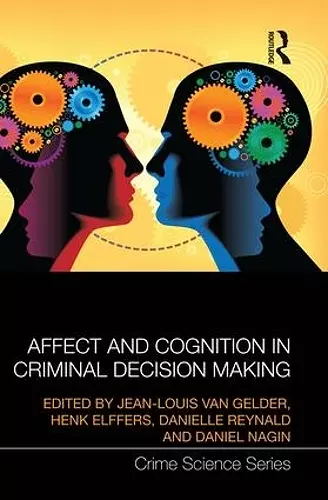Affect and Cognition in Criminal Decision Making
Henk Elffers editor Jean-Louis van Gelder editor Danielle Reynald editor Daniel Nagin editor
Format:Paperback
Publisher:Taylor & Francis Ltd
Published:18th Jul '15
Currently unavailable, and unfortunately no date known when it will be back
This paperback is available in another edition too:
- Hardback£150.00(9780415658485)

Research and theorizing on criminal decision making has not kept pace with recent developments in other fields of human decision making. Whereas criminal decision making theory is still largely dominated by cognitive approaches such as rational choice-based models, psychologists, behavioral economists and neuroscientists have found affect (i.e., emotions, moods) and visceral factors such as sexual arousal and drug craving, to play a fundamental role in human decision processes.
This book examines alternative approaches to incorporating affect into criminal decision making and testing its influence on such decisions. In so doing it generalizes extant cognitive theories of criminal decision making by incorporating affect into the decision process. In two conceptual and ten empirical chapters it is carefully argued how affect influences criminal decisions alongside rational and cognitive considerations. The empirical studies use a wide variety of methods ranging from interviews and observations to experimental approaches and questionnaires, and treat crimes as diverse as street robbery, pilfering, and sex offences. It will be of interest to criminologists, social psychologists, judgment and decision making researchers, behavioral economists and sociologists alike.
"Personally, the editors (and contributors) convinced me of the critical importance of this field in criminology."
Benoit Leclerc, PhD, Senior Lecturer, School of Criminology and Criminal Justice, Griffith University
This collection of papers is a timely and important contribution to our understanding of criminal decision making. It extends the utility of rational choice theory, and enhances its potential for further practical application.
Professor Max Taylor, University of St Andrews
Some while ago I called for researchers in situational crime prevention to ‘make offenders richer’, in the sense of adding emotional and motivational depth to the two-dimensional Rational Choice model, valuable though that has been and will continue to be. Understanding the whole person of the offender – by incorporating affect – can both sharpen and widen our options in designing situational interventions, and suggest new interventions that we have not yet envisaged. The authors of this book have enriched the offender indeed, and in so doing have enriched crime science and criminology in a seminal collection of papers that will stimulate research, theory and practice for years to come.
Paul Ekblom, Professor of Design Against Crime, University of the Arts London
This book makes a unique contribution to the offender decision making literature. Examined in the chapters are the implications of recent developments in emotion research for our understanding of how offenders make decisions. These insights will enhance our knowledge of offending and crime prevention.
Professor Anna Stewart, Griffith University, Australia
ISBN: 9781138933644
Dimensions: unknown
Weight: 362g
246 pages